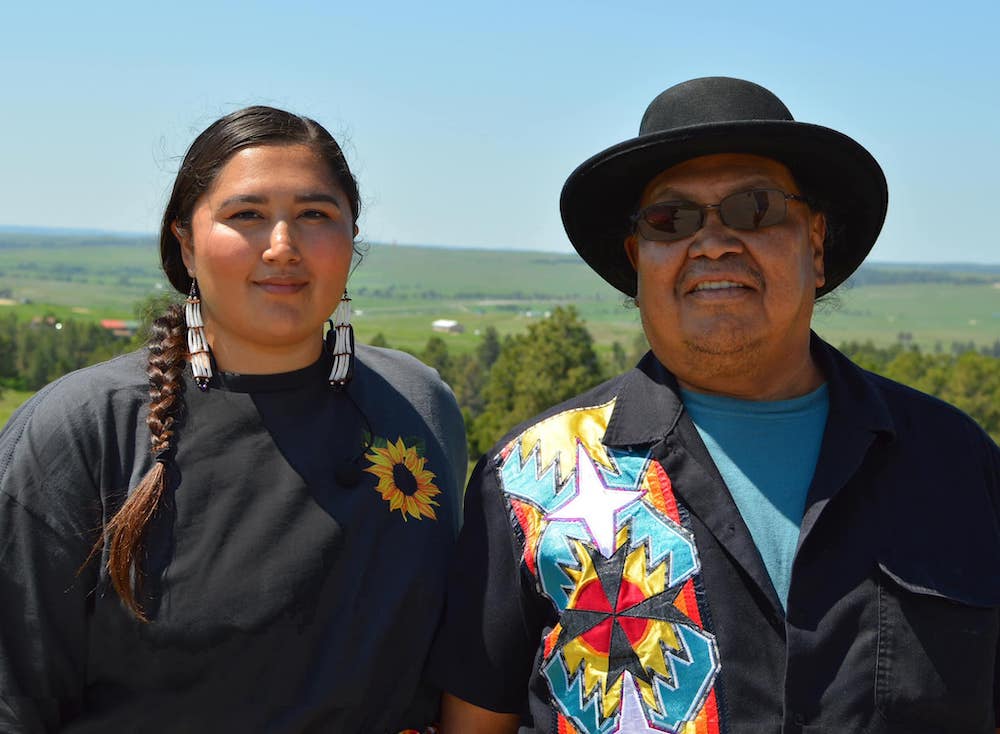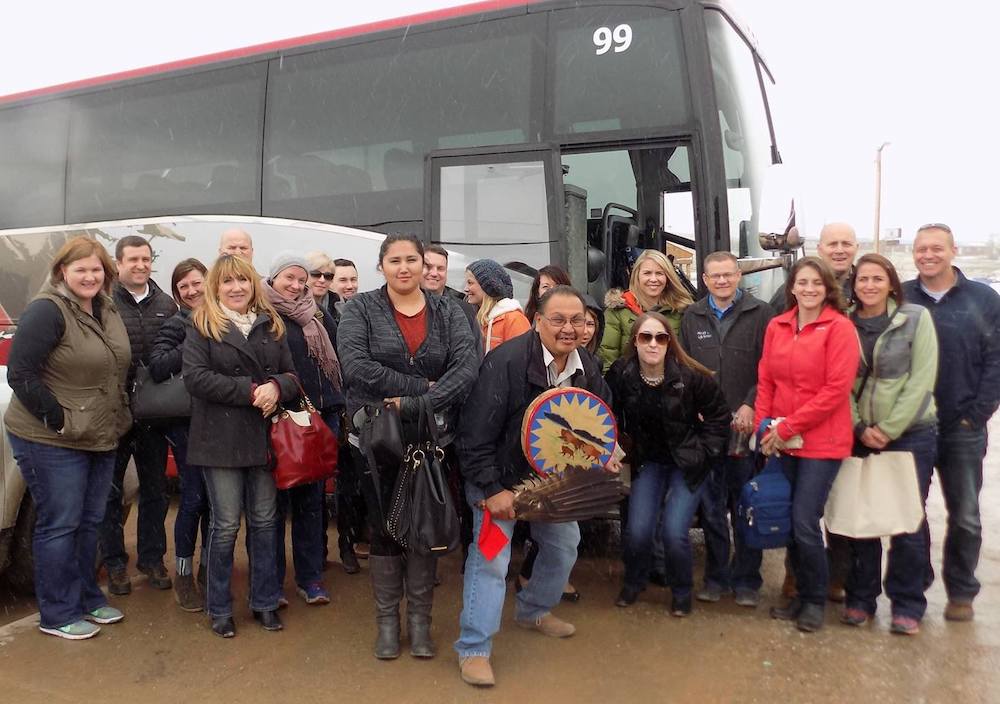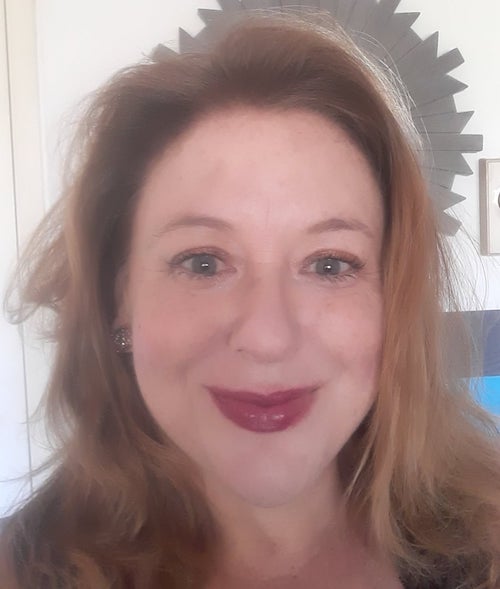
- Details
- By Tamara Ikenberg
- Indigenous Entrepreneurs
A visit to Pine Ridge is the ultimate dose of reservation reality.
The 2.1 million-acre Oglala Lakota reservation in South Dakota and the tip of northern Nebraska is the poorest reservation in the country. It’s also the canvas for Tatanka Rez Tourz, owned by tribal members Tianna Yellowhair and her father Guss.
“We offer a raw and unfiltered experience. We don't sugarcoat anything,” Tianna Yellowhair said. “We’re not a per capita tribe. Our clients get to see how much of a struggle daily life is; how our local tribal people are living three to four families in one home. We want them to see that so that they understand why our work is so important and why we are doing these tours.”
The company’s critical and eye-opening work is being recognized by the tourism industry. This spring, Tianna was recognized as one of the 2023 AIANTA Women Leaders in Tourism, and was invited to speak at the Go International Conference in Albuquerque in April.
Tatanka, which offers tours from March through October, is the only licensed, Native-owned and operated tour guide business in South Dakota.
Eight years in, the company is stronger than ever. In its first year, Tatanka introduced 15 tour groups to Pine Ridge. This year, they had 29 tours booked before the season even started.
A Tatanka Rez tour is a major spiritual and emotional experience, infused with culture, pride and history, Tianna said.
With a smudge of sage or cedar, a welcome song and a dash of Lakota language, the Yellowhairs begin to prepare their clients for the journey.
“We get them ready, because a lot of the stuff we share is very hard,” Tianna said. “We both introduce ourselves in Lakota. It's very important, not just because we both have degrees in Lakota, but because part of giving these tours is being able to reconnect with who we are and letting our tour groups know that we still speak our language.”
Although they spotlight plenty of Pine Ridge's bleak aspects, the Yellowhairs also highlight the beauty of Lakota life with cultural presentations, including dancing and singing.
 Tatanka’s influence extends beyond Pine Ridge. The company has emerged as a valuable role model and consultant for fledgling Indigenous tour businesses and other tourism businesses that lead reservation tours. (Courtesy photo)
Tatanka’s influence extends beyond Pine Ridge. The company has emerged as a valuable role model and consultant for fledgling Indigenous tour businesses and other tourism businesses that lead reservation tours. (Courtesy photo)
Another uplifting element of the tour is a stop at the reservation’s nonprofit Thunder Valley Community Development Corporation, where tribal members focus on reservation-improvement initiatives like food sovereignty and solving the housing shortage.
Giving tours a firsthand look at the hard work underway at Thunder Valley allows the Yellowhairs to directly benefit the reservation. Tianna said tourists are inspired by what they see and often ask how they can donate.
“That's our positive stop. We take them through there because part of it is a learning process for them,” Tianna said. “‘My father calls Thunder Valley ‘a bright light in a sea of darkness.’”
Tatanka also gives back to Pine Ridge by hiring tribal members to drive groups and clean up the areas they visit. The business is also training Native tour guides.
“The majority of people we hire are from within my community, Pass Creek,” Tianna said. “There are nine communities on Pine Ridge, and we try to stick with people in our community just because it's easier for us and it benefits our community.”
Tatanka’s influence extends beyond Pine Ridge. The company has emerged as a valuable role model and consultant for fledgling Indigenous tour businesses and other tourism businesses that lead reservation tours.
On their way to the Go International convention in spring, the Yellowhairs made a stop at another South Dakota reservation to lend their expertise. The visit was facilitated by George Washington University and the South Dakota Native Tourism Alliance.
“We were able to help our relatives on the Rosebud Reservation. We went on a test tour,” Tianna said. “By doing that, we can tell them if they’re market-ready or if they should share some more cultural history, or if they need to clean up a little bit. We mentored them”
A winning plan
A talent for tours runs through Tianna Yellowhair’s blood, and was passed down by her father Guss, a prominent Lakota educator and artist.
“Before we started our business, my father worked for the Chamber of Commerce for numerous years as a consultant and tour guide. When I was in high school, he started letting me go on these tours and I would accompany him like a shadow,” she said. “That's kind of how we got started in the tour guide business. He already had experience, and I was coming into the experience.”
When Tianna’s high school held a business-plan competition with a college scholarship as the prize, her father suggested she make a plan for an independent tour business. Tianna took her dad’s suggestion and followed through with what would prove a winning plan.
“I really wanted to be able to go to college off the reservation,” she said.
She was awarded a scholarship and enrolled at Black Hills State University in Spearfish, S.D., but later decided to return to Pine Ridge to attend the reservation’s tribal college, Oglala Lakota College.
“I came home and I knew that I had a place here. And my father was very supportive of my decision,” Tianna said.
When Tianna returned home, Guss was eager to move forward with their plan for an independent tour business.
“We decided to just jump into it and start doing tours using the money from our pockets as a startup for gas and some advertisement,” Tianna said. “We got the right paperwork, we got certified with the state, we got licensed with the tribe and the state of South Dakota and we went from there.”
The business launched in the summer of 2015, and the local Chamber of Commerce strongly supported Tatanka by steering inquisitive tourists their way.
The Lakota Funds, the Native Community Development Financial Institution (CDFI) that provided Tianna the scholarship back in high school, also stepped in to help with short-term loans that allowed the Yellowhairs to acquire necessities like speakers and a van.
In the beginning, the Yellowhairs faced some community critique from tribal members regarding tour stops, and they took it as an opportunity for change and reflection.
“The big issue was that we were taking people to the Wounded Knee Massacre site. We had (tribal members) come up to us and be very courteous about it, so we stopped doing that,” Tianna said. ”One reason people objected is because it's still an active cemetery and people have family buried there. They don't appreciate people coming in and taking photos and videos. That's what they don't like. So we let our visitors know before they book a tour that we cannot take them to the Wounded Knee site.”
Tianna sees the success of any tribal tourism venture as a boon for Indigenous entrepreneurs, and she’s just as invested in their prosperity as she is in her own.
One of the most effective ways she demonstrates her dedication is with the crucial query she poses at the conclusion of every Tatanka Rez tour.
“I always ask, ‘What's your next destination?’ And I will recommend somebody or a location I know in that area, whether it's a museum,a cultural center, a tour destination or group that's doing tours,” she said.
“I do that because nobody can advertise the market for us better than our own people. Knowing our clients’ next destination is vital because the outside world is not going to do that for us. We've seen it. If we don't tell them, nobody's going to.”
